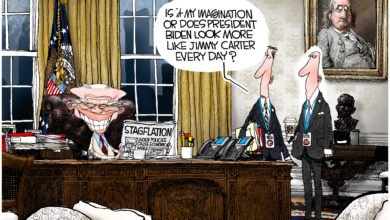Government-Inflicted Inflation Worsens In November
The Bureau of Labor Statistics just released the Consumer Price index (CPI) number for November. The CPI increased by .8% for the month. That means for the prior 12 months, from November 2020 to November 2021, prices increased by 6.8%. That is the highest inflation rate in four decades.
In spite of both the Biden Administration and the Federal Reserve saying the inflation is transitory, it appears that is not the case. Both also say that the cause of the inflation is the supply chain disruptions mostly brought about by the labor shortage.
The truth is that the supply chain disruptions are adding very little to inflation. We know that because the economy as a whole is now producing more goods and services than was produced prior to the pandemic. If the total supply in the economy is that high, then the inflation must be caused almost entirely by other reasons.
As noted numerous times in this column over the past 10 months, the inflation is caused almost entirely by government action. That means that if the government were to reverse its actions, inflation would drop quickly.
Two government actions led to higher costs for both the consumer and for business. Two more actions caused huge increases in total demand. Excess demand is the prime cause of this inflation. That means the inflation will not be significantly reduced until the excess demand is eliminated.
Purposely Higher Energy Prices
On the cost side, the Biden Administration is trying to wean the country off of fossil fuels. As a result, it has taken action to reduce the supply of fossil fuels, both in the short term and the long term. This energy policy has led to higher gasoline, heating oil and natural gas prices. According to the White House, these price increases will not be as high as first anticipated.
That’s an inaccurate conclusion. The small dip we have recently seen in energy prices was all due to an overreaction to the impact of the Omicron variate of COVID. Now that the variant seems to be less harmful, market prices are again beginning to rise and will continue.
Mostly because the federal government gave workers so much free money in the past two years, lower-wage workers have large amounts of savings. Stimulus handouts, increased unemployment compensation, a pause in student loan payments and a moratorium on evictions that allowed many millions of workers to live rent-free for nearly two years, have all resulted in a reluctance for these workers to return to the labor force.
In fact, even though the economy is producing at a full-capacity level, there are almost 4 million fewer workers in the labor force. This labor shortage has resulted in large wage increases, which is also contributing to the uptick in prices for finished goods.
Purely Inflationary Monetary Policy
On the demand side, the federal government has spent nearly $6 trillion more than it received in tax revenue over the past two years. On a $22 trillion economy operating at full capacity, this excess demand is purely inflationary.
The most shockingly irresponsible government action lies with the Fed. In spite of the rapid economic growth since May 2020, the Fed continues to vastly increase the money supply and continues to keep interest rates near zero. In a full-employment economy (unemployment is now 4.2%), this is purely inflationary monetary policy.
Fortunately, the Fed has begun to gradually taper its $120 billion, monthly bond-buying program. This will slow the growth of the money. When Fed officials meet next week, they will likely vote to accelerate that program, although they have yet to consider raising interest rates.
Since the government caused this inflation, government officials have it in their power to can take action to quickly stop it.
Government can reverse the Biden administration’s energy policy and encourage, instead of discourage, energy companies to increase production.
On the wage inflation issue, the Biden administration has to stop paying household bills. It should, instead, encourage people to go back to work so that they can pay their own bills without relying on taxpayers.
Regarding government spending, stop adding to the deficit. That means stop passing programs that continue to spend money that the government simply does not have. Regardless of what anyone says, increasing government spending at this time is purely inflationary.
And lastly, the Fed should more quickly stop the bond-buying program and immediately begin to raise interest rates. Economic growth will exceed 5% this year. Since the economy is already at full employment and since there is excess demand in the economy, there is no reason to continue to have an expansionary monetary policy.
The government caused this inflation. Unless the government takes action to reverse its counterproductive policies, inflation will not go down anytime soon. That means we could see inflation last at least through next year and likely into 2023.



